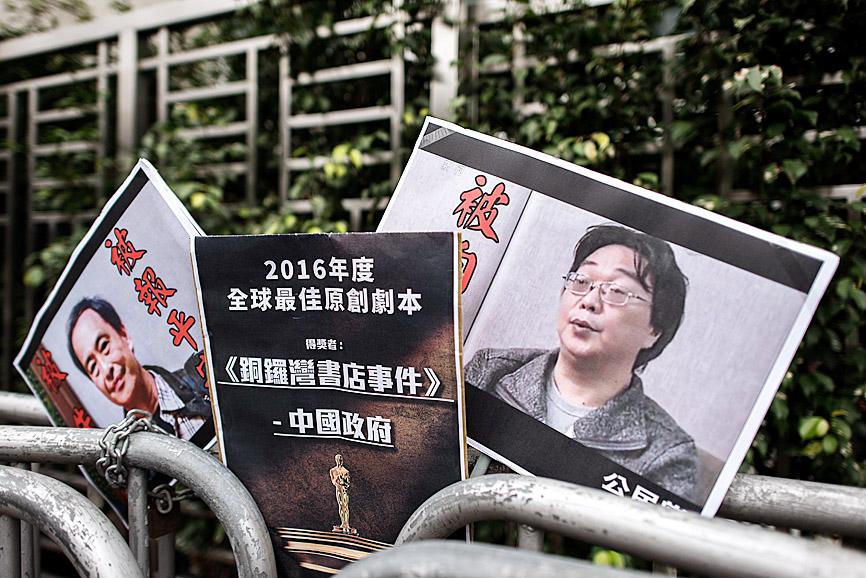Beijing could request countries with which it has extradition agreements to deport Taiwanese to China to face criminal charges following the implementation of national security legislation for Hong Kong, a former Mainland Affairs Council (MAC) official warned yesterday.
Some developing countries, and those close to China because of the Belt and Road Initiative, are likely to accommodate Beijing’s requests to extradite Taiwanese to China, said former deputy MAC minister Chen Ming-chi (陳明祺), who served from July 2, 2018, until May 20, and then returned to his former post as an assistant professor of sociology at National Tsing Hua University.
While Taiwanese should be aware of this situation, they should not restrain their pursuit of freedom of speech, Chen said.

Photo: AFP
“If we remain silent about the situation in Hong Kong, we would be playing into Beijing’s hands. The more China oppresses freedom of speech, the more we should voice our support for Hong Kong,” he said.
The government should work with nations that share similar democratic values to speak up for Hong Kong’s freedom, he added.
That would help limit the horrible effects that the Hong Kong national security legislation would have, he said.
Tung Li-wen (董立文), a consultant for the Taiwan Thinktank, said that Taiwanese are in danger of being deported to China when they visit countries that have extradition agreements with Beijing.
The risk of deportation would be even higher if they travel to pro-Beijing countries that have underdeveloped legal systems, he added.
Extradition agreements generally do not apply to political cases and countries with well-established democratic systems would review extradition requests on a case-by-case basis, he said.
“Taiwanese need to be extra careful when they visit countries that have extradition agreements with Hong Kong,” Tung said.
An example of a person detained by Beijing abroad is Chinese-born Swedish citizen Gui Minhai (桂民海), one of the shareholders of Causeway Bay Bookstore in Hong Kong, who was kidnapped from his holiday home in Thailand in 2015 and reappeared in a video confession in China in 2016.
Gui in Febraury was sentenced to 10 years in prison for illegally providing intelligence overseas.
In cross-strait telephone scams run from a third country, Beijing has also requested host countries to extradite Taiwanese suspects to stand trial in China.
Article 38 of the Hong Kong National Security Law states that the law also applies to non-Hong Kong residents who contravene Chinese laws outside Hong Kong.
Australia, Canada and other countries have suspended the execution of their extradition agreements with Hong Kong due to the article.

NATIONAL SECURITY THREAT: An official said that Guan Guan’s comments had gone beyond the threshold of free speech, as she advocated for the destruction of the ROC China-born media influencer Guan Guan’s (關關) residency permit has been revoked for repeatedly posting pro-China content that threatens national security, the National Immigration Agency said yesterday. Guan Guan has said many controversial things in her videos posted to Douyin (抖音), including “the red flag will soon be painted all over Taiwan” and “Taiwan is an inseparable part of China,” while expressing hope for expedited “reunification.” The agency received multiple reports alleging that Guan Guan had advocated for armed reunification last year. After investigating, the agency last month issued a notice requiring her to appear and account for her actions. Guan Guan appeared as required,

A strong cold air mass is expected to arrive tonight, bringing a change in weather and a drop in temperature, the Central Weather Administration (CWA) said. The coldest time would be early on Thursday morning, with temperatures in some areas dipping as low as 8°C, it said. Daytime highs yesterday were 22°C to 24°C in northern and eastern Taiwan, and about 25°C to 28°C in the central and southern regions, it said. However, nighttime lows would dip to about 15°C to 16°C in central and northern Taiwan as well as the northeast, and 17°C to 19°C elsewhere, it said. Tropical Storm Nokaen, currently

PAPERS, PLEASE: The gang exploited the high value of the passports, selling them at inflated prices to Chinese buyers, who would treat them as ‘invisibility cloaks’ The Yilan District Court has handed four members of a syndicate prison terms ranging from one year and two months to two years and two months for their involvement in a scheme to purchase Taiwanese passports and resell them abroad at a massive markup. A Chinese human smuggling syndicate purchased Taiwanese passports through local criminal networks, exploiting the passports’ visa-free travel privileges to turn a profit of more than 20 times the original price, the court said. Such criminal organizations enable people to impersonate Taiwanese when entering and exiting Taiwan and other countries, undermining social order and the credibility of the nation’s

‘SALAMI-SLICING’: Beijing’s ‘gray zone’ tactics around the Pratas Islands have been slowly intensifying, with the PLA testing Taiwan’s responses and limits, an expert said The Ministry of National Defense yesterday condemned an intrusion by a Chinese drone into the airspace of the Pratas Islands (Dongsha Islands, 東沙群島) as a serious disruption of regional peace. The ministry said it detected the Chinese surveillance and reconnaissance drone entering the southwestern parts of Taiwan’s air defense identification zone early yesterday, and it approached the Pratas Islands at 5:41am. The ministry said it immediately notified the garrison stationed in the area to enhance aerial surveillance and alert levels, and the drone was detected in the islands’ territorial airspace at 5:44am, maintaining an altitude outside the effective range of air-defense weaponry. Following